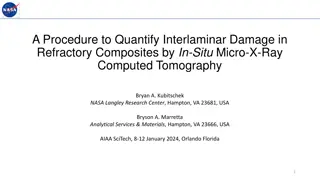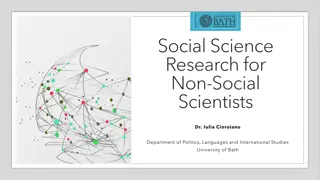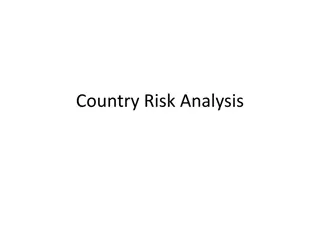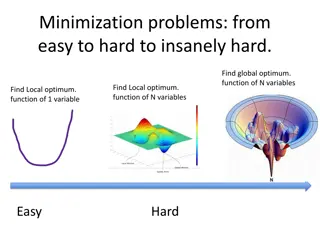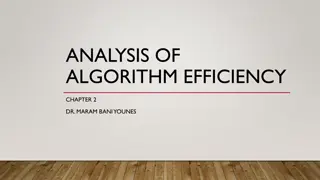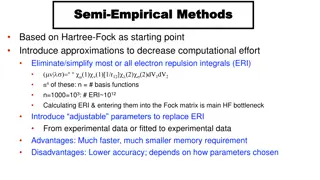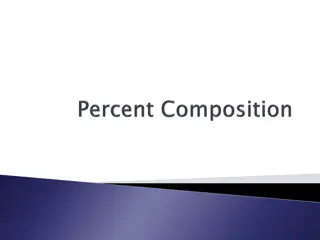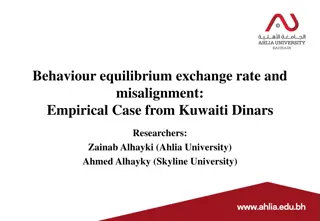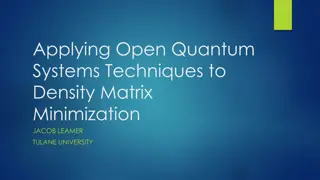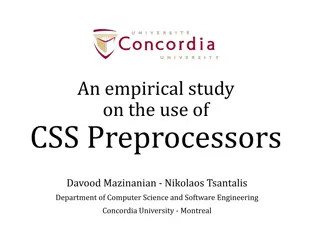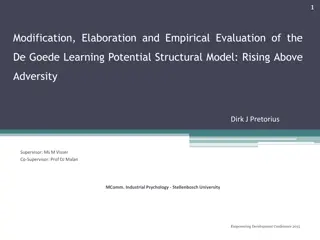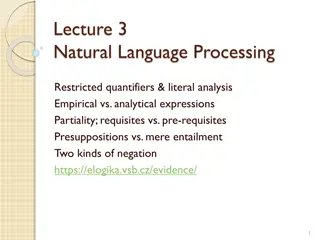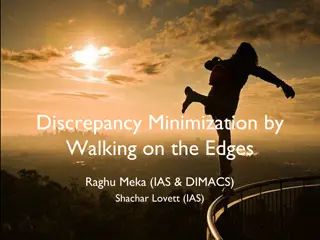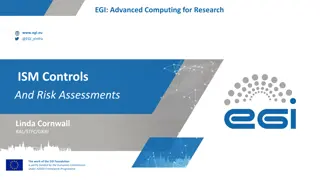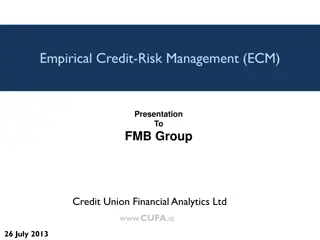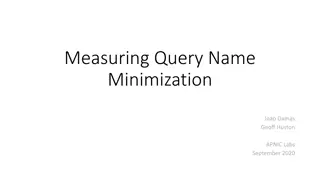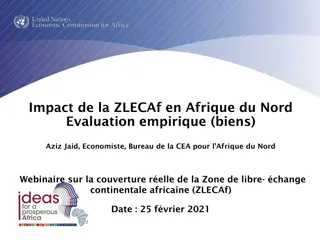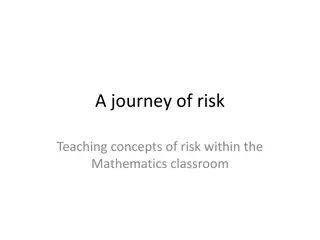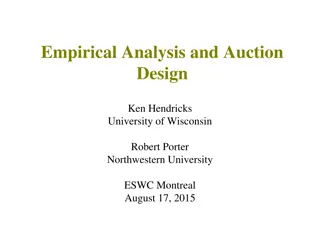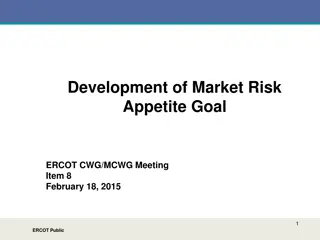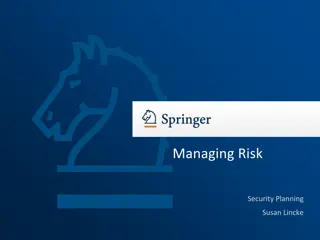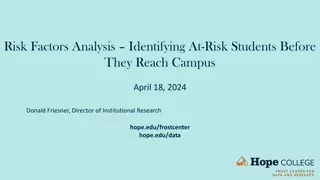Understanding Risk Management in Environmental Geography and Disaster Management
Risk management in environmental geography and disaster management involves assessing the potential losses from hazards, evaluating vulnerability and exposure, and implementing strategies to mitigate risks. It includes calculating risk, dealing with risk through acceptance, avoidance, reduction, or
1 views • 10 slides
Introduction to Flood Risk Assessment with HEC-FDA Overview
This presentation delves into flood risk assessment using HEC-FDA software, covering topics such as defining flood risk, components of uncertainty, consequences of flood risk, and methods to assess flood risk including hydrology, hydraulics, geotechnical, and economics. It explores the intersection
6 views • 39 slides
Procedure for Quantifying Interlaminar Damage in Refractory Composites Using Micro-X-Ray CT
This study presents a method to quantify interlaminar damage in refractory composites through in-situ micro-X-ray computed tomography. The procedure aims to capture the progressive failure in ASTM-sized specimens, providing empirical data for improving simulations of composite materials. Various spe
6 views • 19 slides
Understanding Social Science Research for Non-Social Scientists at University of Bath
This resource delves into social science research fundamentals, encompassing types of inquiry, empirical research categories, primary and secondary research distinctions, and the importance of selecting a suitable research topic. It offers guidance on initiating research based on empirical observati
1 views • 10 slides
Understanding Country Risk Analysis in International Business
Country risk analysis is crucial for multinational corporations (MNCs) to assess the potential impact of a country's environment on their financial outcomes. It includes evaluations of political and economic risks in foreign operations. Sovereign risk, political risk characteristics, and factors are
1 views • 61 slides
Optimization Techniques for Minimization Problems
Explore various minimization problems, from easy to insanely hard, and learn about finding global and local optima using approaches like bisection, Newton's method, and rationalization. Discover efficient methods such as the golden section and iterative approximation with Newton's method for optimiz
0 views • 17 slides
Understanding Algorithm Efficiency Analysis
In this chapter, Dr. Maram Bani Younes delves into the analysis of algorithm efficiency, focusing on aspects such as order of growth, best case scenarios, and empirical analysis of time efficiency. The dimensions of generality, simplicity, time efficiency, and space efficiency are explored, with a d
1 views • 28 slides
Overview of Semi-Empirical Methods Based on Hartree-Fock
Semi-empirical methods derived from Hartree-Fock theory aim to reduce computational effort by approximating or eliminating electron repulsion integrals. Strategies include introducing adjustable parameters to replace ERI calculations and utilizing zero differential overlap methods like CNDO, INDO, N
1 views • 11 slides
Project Risk Management Fundamentals: A Comprehensive Overview
Project risk management involves minimizing potential risks and maximizing opportunities through processes such as risk management planning, risk identification, qualitative and quantitative risk analysis, risk response planning, and risk monitoring and control. Quantitative risk analysis assesses t
0 views • 41 slides
Parallel Implementation of Multivariate Empirical Mode Decomposition on GPU
Empirical Mode Decomposition (EMD) is a signal processing technique used for separating different oscillation modes in a time series signal. This paper explores the parallel implementation of Multivariate Empirical Mode Decomposition (MEMD) on GPU, discussing numerical steps, implementation details,
1 views • 15 slides
Understanding Percent Composition and Empirical Formulas in Chemistry
The Law of Definite Proportions governs the composition of compounds based on molar masses, allowing us to calculate percentage compositions of elements within a compound. Through examples involving various compounds like Fe3C, sulfur dioxide, ammonium nitrate, glucose, and acetic acid, we explore t
3 views • 7 slides
Exploring Algorithm Design Approaches with Dr. Jey Veerasamy
Discover a range of algorithm design approaches including quick-sort, merge-sort, divide and conquer characteristics, greedy approach, and solutions to various optimization problems such as petrol cost minimization, number of stops minimization, activity selection, and knapsack problem. Dive into th
0 views • 14 slides
Multi-Criteria Test Suite Minimization with Integer Nonlinear Programming
The study introduces a method for minimizing test suites using Integer Nonlinear Programming. It addresses regression testing challenges, such as managing large numbers of test cases, through Multi-Criteria Test Suite Minimization (MCTSM). The research explores the application of Integer Programming
0 views • 34 slides
Empirical Research on Surrogacy in New Zealand: Key Findings
Associate Professor Debra Wilson from the University of Canterbury in New Zealand conducted empirical research on public opinions regarding surrogacy. The findings revealed three surprising results, including perspectives on surrogates being compensated, the importance of genetics in surrogacy arran
0 views • 11 slides
Generalization of Empirical Risk Minimization in Stochastic Convex Optimization by Vitaly Feldman
This study delves into the generalization of Empirical Risk Minimization (ERM) in stochastic convex optimization, focusing on minimizing true objective functions while considering generalization errors. It explores the application of ERM in machine learning and statistics, particularly in supervised
0 views • 11 slides
Empirical Analysis of Kuwaiti Dinar Exchange Rate Behavior and Misalignment
This research focuses on studying the behavior of the real equilibrium exchange rate (REER) of Kuwaiti Dinars, estimating the equilibrium exchange rate using the BEER model, and calculating real exchange misalignments (RERM). It delves into the impact of exchange rate fluctuations on macroeconomic v
0 views • 15 slides
History of Chemotherapy: From Empirical Use to Modern Era
The history of chemotherapy is divided into three phases, starting from the empirical use of compounds in ancient times to the modern era marked by targeted drug development. Ehrlich's pioneering work in the late 19th to early 20th centuries laid the foundation for understanding the selective toxici
0 views • 15 slides
Advancements in Quantum Systems Techniques for Density Matrix Minimization
Discover the innovative methods and applications of open quantum systems techniques for density matrix minimization. Explore the motivation behind the research, early developments, purification processes, linear scaling potentials, Bloch's method intricacies, quantum channel algorithms, canonical de
0 views • 22 slides
Empirical Study on CSS Preprocessors: Insights and Findings
Exploring the utilization of CSS preprocessors in web development through an empirical study conducted by Davood Mazinanian and Nikolaos Tsantalis from Concordia University. The study delves into the motivations behind using CSS preprocessors, developers' preferences, features offered by preprocesso
0 views • 24 slides
Empirical Evaluation of De Goede Learning Potential Model
This research paper focuses on the modification and extension of the De Goede Learning Potential Structural Model, aiming to identify non-cognitive variables influencing learning potential. Through model development, hypothesis testing, and empirical evaluation, the study explores factors such as In
0 views • 12 slides
Experimental Investigation of Risk Perception in Wine Purchases
The American Association of Wine Economists' 10th Annual Conference delved into consumer behavior and perceived risk when buying wine. The study explored risk, uncertainty, ambiguity, and conflict in wine purchases, presenting preliminary findings on risk-taking behaviors. An experimental investigat
0 views • 26 slides
Understanding Empirical vs Analytical Expressions in Natural Language Processing
Restricted quantifiers and literal analysis in natural language processing reveal the distinctions between empirical and analytical expressions. While empirical expressions refer to non-trivial intensions that require empirical investigation, analytical expressions denote constant intensions that ca
1 views • 19 slides
Understanding Discrepancy Minimization in Combinatorial Concepts
Explore the intriguing world of Discrepancy Minimization through concepts like walking on the edges, subsets coloring, arithmetic progressions, and more. Delve into fundamental combinatorial concepts and complexity theory to understand the significance of Discrepancy theory in various fields. Discov
0 views • 33 slides
Understanding Risk Concepts and Management Strategies in Finance
Explore the essential concepts of risk in finance, such as risk definition, risk profiles, financial exposure, and types of financial risks. Learn about risk vs. reward trade-offs, identifying risk profiles, and tools to control financial risk. Understand the balance between risk and return, and the
0 views • 18 slides
Risk and Return Assessment in Financial Management
This comprehensive presentation explores the intricacies of risk and return assessment in the realm of financial management. Delve into understanding risk concepts, measuring risk and return, major risk categories, and the impact of risk aversion on investment decisions. Gain insights into the manag
0 views • 62 slides
Risk Management and Security Controls in Research Computing
The European Grid Infrastructure (EGI) Foundation conducts risk assessments and implements security controls in collaboration with the EOSC-hub project. The risk assessments involve evaluating threats, determining likelihood and impact, and recommending treatment for high-risk threats. Results from
0 views • 13 slides
Empirical Credit Risk Management at FMB Group Credit Union
Empirical Credit-Risk Management (ECM) presentation to FMB Group Credit Union by Financial Analytics Ltd discusses the background, traditional forecasting methods, income and risk recognition, provisioning approaches, and benefits for credit unions. ECM offers expert retail credit risk management th
0 views • 25 slides
Risk Management & MPTF Portfolio Analysis at Programme Level for UN Somalia
This session delves into the world of risk management and portfolio analysis at the programme/project level, specifically focusing on the Risk Management Unit of the United Nations Somalia. It covers enterprise risk management standards, planned risk management actions, the role of RMU, joint risk m
0 views • 30 slides
Alcohol and Cancer Risk: Understanding the Links
Alcohol consumption is linked to an increased risk of various cancers, including mouth, throat, esophagus, breast, liver, and colorectal cancers. Factors such as ethanol, acetaldehyde, nutrient absorption, estrogen levels, and liver cirrhosis play a role in this risk. Even light drinking can elevate
0 views • 17 slides
Exploring Query Name Minimization in DNS Resolution
Delve into the world of query name minimization in DNS resolution, examining its adoption from the perspectives of end users, queries, and recursive resolvers. Understand the common resolver implementations and the techniques described in RFC 7816. Gain insights from user measurements and results fr
0 views • 18 slides
Impact of ZLECAf in North Africa: Empirical Evaluation
The Economist, Aziz Jaid, from the CEA Bureau for North Africa conducted an empirical evaluation on the impact of the ZLECAf in North Africa, focusing on goods. The context includes coverage of seven countries, the rationale behind the ZLECAf agreement, and details on the liberalization scenarios an
0 views • 13 slides
Understanding Risk Concepts in the Mathematics Classroom
Risk is a concept integral to decision-making in various aspects of life. This resource explores how risk is defined in the real world, its relevance in the classroom, and strategies for teaching risk literacy to students. It delves into the multiple definitions of risk, risk analysis, and the emoti
0 views • 62 slides
Understanding Action and Perception through Minimization of Prediction Error
This talk by Karl Friston delves into how our interaction with the environment can be explained by the minimization of surprise or prediction error. It explores the role of predictive coding in perception and motor reflexes in action, showcasing phenomena like hierarchical brain messaging and percep
0 views • 25 slides
Understanding Auction Design: Empirical Analysis and Practical Insights
Auctions play a crucial role in various sectors due to their efficiency in price discovery and resource allocation. This article delves into auction design issues, the role of structural analysis, and the transformative Laffont program. Discover the importance of empirical analysis in optimizing auc
0 views • 59 slides
Understanding Organizational Risk Appetite and Tolerance
Explore the development of market risk appetite goals and how to define and establish organizational risk tolerance. Learn about the Classic Simplified View of Risk Tolerance and different methods to determine risk appetite. Discover the importance of assessing market risk impact and aligning risk t
0 views • 8 slides
Developing a Risk Appetite Culture: Importance and Framework
Risk management plays a critical role in the success of corporations, with strategy and risk being intertwined. This presentation delves into definitions of key terms such as risk appetite, the Risk Appetite Cycle, characteristics of a well-defined risk appetite, and the importance of expressing ris
0 views • 31 slides
Security Planning and Risk Management Overview
This content provides an in-depth exploration of managing risk, security planning, and risk appetite in the context of cybersecurity. It covers essential concepts such as risk management process, threat types, risk analysis strategies, vulnerability assessment, and risk mitigation techniques. The ma
0 views • 73 slides
The Interplay Between Theoretical Psychology and Empirical Research
Exploring the potential for collaboration between philosophy, theoretical psychology, and empirical research, this article delves into the historical divide, recent renaissance, and avenues for mutual enrichment. It raises questions about how each discipline can contribute to and benefit from the ot
0 views • 16 slides
Risk Factors Analysis: Identifying At-Risk Students Before They Reach Campus
Risk Factors Analysis aims to identify students at risk of attrition before they even arrive on campus by evaluating academic, financial, minority, and first-generation factors. The method involves choosing specific risk factors, tracking historical prevalence, calculating relative risk, and predict
0 views • 15 slides
Comprehensive Risk Assessment Training Overview
In this risk assessment training session held on November 23, participants reviewed the process of writing and reviewing risk assessments to enhance the quality of assessments for safer scouting experiences. The training aimed to improve leaders' skills and confidence in risk assessment practices wh
0 views • 37 slides


